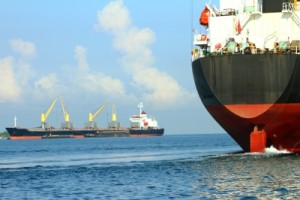 Ifugao Representative Teodoro Brawner Baguilat, Jr. is pushing for the passage of his bill that will allow foreign carriers to dock at multiple ports in the country as long as their cargoes are intended for import or export and are duly cleared by the Bureau of Customs (BOC).
Ifugao Representative Teodoro Brawner Baguilat, Jr. is pushing for the passage of his bill that will allow foreign carriers to dock at multiple ports in the country as long as their cargoes are intended for import or export and are duly cleared by the Bureau of Customs (BOC).
House Bill (HB) No. 5126 also seeks to exempt the carriage of containers from the provisions of Section 1009 of Presidential Decree No. 1464, otherwise known as the Tariff and Customs Code of 1978.
A similar bill was passed by the Committee on Trade, Commerce, and Entrepreneurship in the Senate late last year.
Senate Bill (SB) No. 2364 (“An Act Exempting the Carriage of Container Vans from the Provisions of Section 1009 of Presidential Decree No. 1464, Otherwise Known as the Tariff and Customs Code of 1978, and for Other Purposes”) has gathered approval from stakeholders such as the Philippine Liner Shipping Association, Association of International Shipping Lines, foreign chambers, and government agencies such as the Maritime Industry Authority and Philippine Ports Authority.
Authored by Senator Paolo Benigno “Bam” Aquino IV, SB 2364 will be endorsed for plenary hearing in the Senate next week.
HB 5126, filed in October last year, is pending with the Committee on Ways and Means chaired by Marikina 2nd District Representative Romero “Miro” Quimbo.
Both the House and Senate bills are seen to address the issue of cabotage in the country, where international shipping lines are barred from plying the inter-island trade unless they have a special permit to do so from the Maritime Industry Authority.
Baguilat, chairman of the House Committee on Agrarian Reform, said HB 5126 aims to assist importers and exporters enhance their competitiveness amid intensifying international trade, and to lower the cost of shipping local and foreign cargoes.
The proposed bill also heeds the 2013 call of President Benigno Aquino III in his state of the nation address and stakeholders to introduce reforms in the shipping industry.
“In the end, the proposal balances the interests of the domestic shippers and micro small and medium enterprises (MSMEs). The domestic shippers can still have the exclusive right to service domestic shipments and the MSMEs who are importing or exporting goods will be able to access a cheaper alternative through co-loading in foreign ships,” Baguilat said.
Since the Philippines is an archipelago, the solon said, shipping is an integral part of trade and commerce in the country and its costs impacts the movement and price of traded goods.
“Facilitating inter-island trade in the country has become costly and cumbersome for MSMEs (micro, small, and medium enterprises). Currently, inter-island shipping is exclusively reserved for ships bearing the Philippine flag. While this helps the domestic shipping industry, the cost of shipping is hampering trade especially for the MSMEs,” Baguilat said.
The following are the provisions of Baguilat’s bill, which are the same as those in Aquino’s bill:
- A foreign container van carrying foreign cargo arriving from a foreign port on a foreign vessel, such foreign vessel, after clearing at its port of entry, shall be allowed to carry the foreign container van to its domestic port of final destination.
- A foreign container van carrying foreign cargo arriving from a foreign port on a foreign vessel may be carried by another foreign vessel calling at the same port of entry to the domestic port of final destination of such foreign cargo.
- A foreign container van carrying foreign cargo intended for export may be carried on a foreign vessel from its domestic port of origin through another Philippine port to its foreign port of final destination.
- A foreign container van carrying foreign cargo intended for export may be transshipped in any foreign vessel from its domestic port of origin through a domestic transshipment port and transferred at such domestic transshipment port to another foreign vessel which shall carry it to its foreign port of final destination.
- An empty foreign container van going to or coming from any domestic port or going to or coming from a foreign port will be allowed carriage on an international shipping line.
- An empty foreign container van being transshipped between two Philippine domestic ports will be allowed carriage on an international shipping line.
Similar to Aquino’s bill, HB 5126 will also not consider foreign vessels as common carriers nor as offering public services. – Roumina Pablo
Image courtesy of kongsky at FreeDigitalPhotos.net





